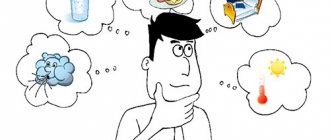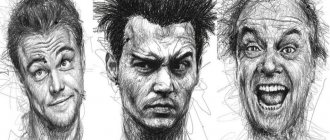4.6
Average rating: 4.6
Total ratings received: 192.
4.6
Average rating: 4.6
Total ratings received: 192.
The process of human personality formation begins in early childhood. As we grow and mature, each of us tries to find our place in the world and develop an attitude towards different aspects of life. Because people are brought up in different environments and have different experiences, their outlook on life can differ significantly. Let's try to figure out what role worldview plays in a person's life and what this term means.
Concept of worldview
Briefly, a worldview can be defined as a system of views on the surrounding reality, nature, society, and one’s place in the world that has developed in the process of life. Everything a person encounters causes him to react in a certain way. This inner response is made possible by worldview.
If we talk about what shapes a person’s worldview in a person’s life, we can list the following factors:
- family;
- Friends;
- society as a whole;
- level of development of science and technology;
- education;
- occupation;
- self-development, self-education and self-discipline.
Rice.
1. Student. The first six points can be attributed to external sources of worldview formation, the last - to internal ones. Often, for a person who is interested in self-development and is able to take responsibility for his own life, internal motivation comes first.
What influences the formation of a worldview?
As noted above, a person’s worldview is formed throughout life under the influence of various external factors. The greatest influence is exerted by such factors as:
- Environment. Of course, first of all, these are the people surrounding the child as he grows up. These are parents and other relatives, educators and mentors. For most people, environment is the most important factor. For example, believers, as a rule, adhere to exactly the religion to which their parents taught them.
- Society. The worldview of society also plays an important role. As the child grows up, he largely adopts it through culture, traditions and stereotypes. His idea of his place in society, family life, success and other social aspects is formed precisely on the basis of his social worldview.
- Religion. Most of the world's religions directly indicate what views a believer should adhere to, and also regulate the main aspects of personal and social life.
- Education and science. A high level of education usually helps a person develop a scientific worldview. He begins to separate emotions from facts and evaluate the reliability of new knowledge.
- Epoch. Worldview can be a sign of the era and temporary circumstances in which a person grows and matures. This factor has become especially significant now, in the era of accessible information and rapid development of technology. That’s why the worldview of most people now is so different from their parents’.
- Profession. The main type of activity, professional knowledge and experience have a significant impact on the formation of a worldview. The best example here are the psychologists mentioned above, for whom their education and experience allow them to understand much better not only the emotions of others, but also their own.
Functions of worldview
All decisions made by a person in the process of life depend on his views on the world around him. Let's get acquainted with the main functions of worldview in human life.
Defining goals and benchmarks
Life guidelines are laid in early childhood and are based on family values. A child’s views on the world depend on how his parents perceive the surrounding reality. The guidelines may change in the future.
Rice. 2. Family values.
Depending on what values a person is guided by, his life goals are determined. For example, for one person the main thing is career growth, for another it is finding family happiness. Aimless existence leads to gradual degradation of personality, its self-destruction. Thus, worldview determines the motives and goals of human activity.
Defining ways of doing things
When a person sets a goal, he decides how to achieve it. Actions will be determined by views on the world around us. For example, when someone wants to get a lot of money, he can start developing his own business, improving his professional skills. There is another way - to get easy money by robbing a bank. The choice of method to achieve the goal will depend on the values and principles of the person.
Rice. 3. Head of the company.
The role of worldview in people’s activities is that it helps us develop our own methods of obtaining new knowledge necessary to achieve goals.
Definition of true values
When a person determines goals in life and takes any action, he is guided by his own values and principles. In the process of life, he comes to understand which of these values are imposed from the outside, that is, false.
It happens that parents, guided by their own ideas, force their child to get not the profession that he wants, but one that seems prestigious or more promising to them. This can lead to frustration, burnout, and even depression. In this case, you should think about changing your occupation.
The role of worldview in human activity is to determine the true values of life, which are important specifically for his inner world.
Worldview and its role in human life
Social work is characterized by subject-subject relationships, in which the client often plays an active role. Therefore, its effectiveness is determined by the extent to which social interaction takes into account the inner world of a person, the core of which is worldview. That is why in social work it is so important to pay attention to problems of an ideological nature. In this regard, let us answer the question: what is a worldview, what is its role in human life?
Worldview is a system of views on the world and a person’s place in this world, which largely determines a person’s attitude towards this world, other people, himself, as well as their beliefs, ideals, principles of knowledge and activity determined by these views.
There are different types of worldviews that cover a certain range of issues: magical, mythological, religious, everyday (everyday), philosophical, scientific, as well as various mixed types of them. Worldview is formed in the process of human interaction with the outside world and represents an autonomous and stable system of internal determinants of human life. It determines the social well-being, self-awareness of the individual, his value orientations, assessments and behavior. Thus, a worldview is a holistic, multi-level system of social attitudes that plays a decisive role in human life. A person’s worldview system is always specific and reflects the individual characteristics of his life.
The formation of individual characteristics of a worldview depends on the influence of both external and internal factors in a person’s life. External targeted social influences play a great influence on the process of worldview formation. Accordingly, the principles of an individual’s social behavior are largely determined by the specific material and spiritual conditions of life. At the same time, only the internal activity of the subject, aimed at self-knowledge, allows the most adequate cognizance and perception of social and natural reality. According to N.A. Berdyaev, the road to the outside world lies through the inner, because the meaning is in the person himself.
The origin of man, his place in the universe, his relationship to God, the fate and meaning of human existence - all these questions were considered with great depth and power in the works of Russian religious philosophers. Russian thinkers saw in man not only an earthly, but also a cosmic being, the essence of the entire Universe, the main value of the universe. “Each person, by his inner nature, is a kind of great world - a microcosm in which the entire real world and all historical eras are reflected and reside,” wrote N.A. in the book “The Meaning of History.” Berdyaev. He called man “existential, terrible and final” freedom. A person cannot be fully understood by reason. He is always more than he seems in his outer manifestations. It represents in some way infinity. And its irrationality and infinity are explained by the internal fusion of man with the infinity of the spiritual kingdom.
A person is characterized by a desire for transcendence, a search for a way out of subjectivity. This process can occur in two ways. The first option is associated with entering society with its imperative forms, values and standards, which leads to the leveling of the individual. The second path is transcendence, during which existential encounters with God and another person occur. In the first case, a person becomes depersonalized, in the second, he has freedom, there is no external coercion and suppression, the superpersonal acquires a personal character.
Russian thinkers wrote that man was created in the image and likeness of God, however, he is a natural being. In his capacity, he is included in the cycle of life. Embodying the image and likeness of God, man is a person who is in confrontation with the common world, with the world of evil, he is always free. Man is a mystery, but not as an animal, not as a social being, but as a person. Only personality makes a person different from other things in the world. The emergence of personality makes it possible to detect the lack of self-sufficiency of the world and the possibility of overcoming it. ON THE. Berdyaev believes that the entry of an individual into the world changes the course of the world process, although outwardly this is imperceptible.
The problem of creative understanding of the teachings of Russian religious philosophers about man, his place and role in the world is currently acquiring particular relevance due to the fact that there is currently a reassessment of values, established concepts, stereotypes, views on the nature of things and the essence of man. At the same time, at the present stage of development of Russian society, there is a revival of religious consciousness, which has led to a significant increase in the number of religiously believing people in the country.
The authority of the Orthodox Church is strengthening in the public consciousness, Christian teaching is becoming widespread, exerting an increasingly significant influence on the views and behavior of people. This means that in the conditions of the spiritual and moral revival of Russian society, the religious dominant has a significant impact on the inner world of many people and this is very important to take into account in social work.
Social workers must not only be familiar with the problems of religious worldview, but also be able to competently answer questions that arise in the process of professional activity. This is all the more important because more than sixty percent of people receiving social assistance are carriers of a religious worldview, and there are also many religious people among social workers.
It should be noted that the dialectical-materialist worldview was unable to deeply and adequately explain the surrounding reality. Currently, reality is being comprehended not only at the level of logical analysis, but also at the level of emotional and spiritual perception of the world and man, at the level of psychological synthesis of subtle matters.
A new approach to understanding existence enriches the understanding of modern humanism, which is endowed with a new quality, a quality that characterizes man and his life in cosmic parameters. The teaching of “cosmic humanism”, in which the future of the world is determined by the high spirituality of man, overcoming all filth, evil and violence, is gaining increasing recognition among foreign and domestic scientists. The following conceptual ideas in this direction are distinguished:
— harmony of man, nature and Space;
— the unity of all things in the Universe;
— ontological unity of Man and God;
— ethical relativism, etc.
Important for the personal and social behavior and well-being of people is their solution to the question of the meaning and purpose of life. As E. Fromm wrote, “Man is the only animal for whom his own existence is a problem; he must solve it, and he cannot hide from it anywhere.” Unlike a goal, which represents a certain milestone, the meaning of life is the direction of a person’s life activity, realized in a person’s moral values. Thus, the meaning of life is the objective content of life itself and at the same time the desire for a higher goal. Finding the true meaning of life is a very difficult process. The meaning of life is in the real existence of a person, and only here can it be suffered through the process of self-affirmation and moral quest.
There are different points of view on the meaning of life, sometimes mutually exclusive. According to one of them, existence is devoted exclusively to the well-being of one’s own person, personal self-improvement, personal salvation. The other comes down to the fact that the meaning of human existence is taken beyond the individual: service to God, society, a great idea, etc. There are other options for answering the question about the meaning of life. In our opinion, when searching for meaning, one must be guided by the position of L.N. Tolstoy that “the rational meaning of life must have the dignity of indestructibility and in a certain respect turns out to be more valuable than life itself.”
When determining the meaning of life, it is wrong to contrast the personal and the social, to absolutize one of them. As V. Solovyov noted, it is a mistake to see in the life of humanity only the general masses, and to recognize the individual as an insignificant and transient element of society, which does not have any rights of its own and which can be ignored in the name of the so-called general interest. Personality and society are inseparable; they presuppose each other. Society is an augmented or expanded personality, and personality is a compressed or concentrated society.
In the context of radical transformations in the socio-economic and political spheres of Russian society, the problem of the meaning of life and the purpose of life has become significantly worse. The number of people who have lost their orientation in life and the meaning of existence has increased, which has led not only to an increase in the number of neuropsychiatric diseases, but also to a sharp exacerbation of many social problems (drug addiction, drunkenness, prostitution, crime, etc.). And this problem requires serious analysis and an optimal solution.
In this regard, it is worth mentioning logotherapy developed by V. Frankl - a teaching focused on the study of meaningful characteristics of existence and on providing assistance in finding and understanding the meaning of life. V. Frankl considered it natural for a person to seek and realize the meaning of life, which is the main driver of behavior and personal development. He believed that the meaning of life is available to any person. A person's life cannot lose meaning under any circumstances; the meaning of life can always be found. “However, finding meaning is not a question of knowledge, but of vocation; it is not a person who poses the question about the meaning of his life - life poses this question to him, and a person has to answer it daily and hourly not with words, but with actions,” wrote V. Frankl.
The need to realize the meaning of life is determined by the finitude, limitations and irreversibility of human existence. Man, thanks to free will, finds and realizes the meaning of life, thereby realizing himself. People who have lost the meaning of their existence are deeply unhappy people. They need help. As a means of overcoming the loss of meaning, logotherapy is aimed at turning consciousness to truly spiritual entities and to three groups of values: the values of creativity, experience and relationships. Without going into a description of the technology of assistance proposed by Frankl, we note that it is these vitally disorientated people who most often need social assistance.
Thus, worldview, being the core of a person’s inner world, plays the role of a kind of life compass that determines his decisions and actions.
Components
What does a worldview include?
This concept consists of complex elements that include beliefs, values, knowledge, ideals, norms, emotions and feelings.
In general, they can be divided into the following categories:
- Cognitive . Represents generalized knowledge, both everyday and professional. These are ideas about how everything works, how life arose, what a person is like, how society works, etc.
- Value-normative. These are norms, ideals and values. This includes ideas about the meaning of life, goals, good and evil, morality, religion, etc.
- Emotionally-volitional. This category includes beliefs, beliefs, and personal opinion. This implies not only the intellectual base of the individual, but also his emotional state.
- Practical . The category under consideration is understood not only as a set of knowledge, values, beliefs and personal views. It is also a real willingness to behave in a certain way in certain circumstances.
Read about psychological compatibility of temperaments here.
What have we learned?
Worldview is a person’s developed system of views on the world around him and his place in this world. The role of worldview in the life of society and the individual is to determine goals and guidelines, methods of activity, and the formation of true values.
Previous
Social studies Signs of a democratic regime - brief examples in Russia, social studies table (grade 9)
Next
Social studies Totalitarianism, democracy, authoritarianism - types of political regimes briefly in the table (social studies)











